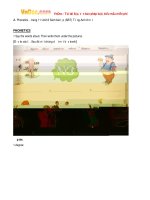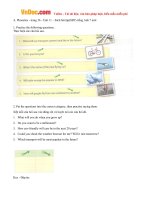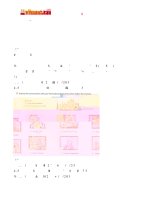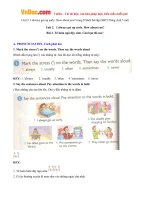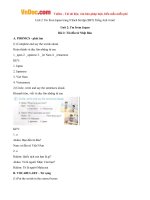giai bai tap sbt tieng anh lop 8 chuong trinh moi unit 2 life in the country side
Bạn đang xem bản rút gọn của tài liệu. Xem và tải ngay bản đầy đủ của tài liệu tại đây (336.92 KB, 14 trang )
VnDoc - Tải tài liệu, văn bản pháp luật, biểu mẫu miễn phí
A. Phonetics - trang 9 Unit 2 Sách bài tập (SBT) Tiếng Anh 8 mới
A. Phonetics - Ngữ âm
1.
a. Write a word under each picture. All the words should contain /bl/ or /cl/.
Viết một từ bên dưới mỗi bức tranh. Tất cả các từ nên bao gồm /bl/ hoặc /cl/.
b. Put the words into the right columns. Then say them aloud.
Đặt các từ vào cột bên phải. Rồi đọc to chúng.
KEY
a.
1. black (màu đen)
2. clock (đồng hồ)
3. class (lớp học)
4. cloud (đám mây)
5. clown (chú hề)
6. blue (màu xanh nước biển)
7. clothes (quần áo)
8. blouse (áo nữ)
9. blow (thổi)
b.
2. Underline the words with /bl/ or /cl/ in the sentences. Then read the sentences aloud.
Gạch chân những từ với /bl/ hoặc /cl/ trong câu. Rồi đọc to các câu.
1. The garden is blossoming beautifully. (Khu vườn đang nở hoa rất đẹp)
2. I enjoy picking blackberries in the woods. (Tôi thích hái dây đen trong rừng)
3. The sky looks so clear and blue in the countryside. (Bầu trời rất trong và xanh ở miền quê)
4. After the surveỵ, we have to report our findings to the class. (Sau khi làm thống kê, chúng tôi phải báo
cáo trước cả lớp)
5. Click the mouse twice to open this file. (Chọn chuột 2 lần để mở tệp này)
6. My favourite colour is blue. (Màu yêu thích của tôi là màu xanh nước biển)
KEY
1. The garden is blossoming beautifully.
VnDoc - Tải tài liệu, văn bản pháp luật, biểu mẫu miễn phí
2. I enjoy picking blackberries in the woods.
3. The sky looks so clear and blue in the countryside.
4. After the surveỵ, we have to report our findings to the class.
5. Click the mouse twice to open this file.
6. My favourite colour is blue.
B. Vocabulary & Grammar - trang 10 Unit 2 Sách bài tập (SBT) Tiếng Anh 8 mới
B. Vocabulary & Grammar - Từ vựng & Ngữ pháp
1. Verbs and nouns that go together. In each box, circle one noun which does not go with the verb.
Động từ và danh từ đi với nhau. Trong mỗi ôm khoanh tròn một danh từ mà không đi với động từ.
KEY
a. a taxi (xe taxi)
b. the chickens (những con gà)
c. milk (sữa)
d. courage (dũng cảm)
e. an answer (câu trả lời)
f. a fish (con cá)
g. posts (các bưu phẩm)
h. meat (thịt)
2. Choose one noun from each box and write a sentence using it with the corresponding verb.
Chọn một danh từ từ mỗi ô và viết một câu dùng danh từ đó với một động từ tương ứng.
Example:
ride/ a camel —> I would like to know how it feels to ride a camel.
VnDoc - Tải tài liệu, văn bản pháp luật, biểu mẫu miễn phí
KEY
Students' answers
Học sinh tự trả lời
3. Use the adjectives below to complete the sentences.
Sử dụng tính từ dưới đây để hoàn thành các câu.
1. I love the people in my village. They are so _______ and hospitable.
2. I sometimes lie and watch the _______ movement of the clouds.
3. Some peoples in the mountains of north Viet Nam used to have a _______ life. They moved to get
food and find new lands for growing rice.
4. Don't worry. It's _______ to travel here, even at night.
5. It's so _______ to send a letter from my village. The nearest post office is miles away.
6. Be _______! There's an exam going on.
7. I love the _______ sky on starry nights. It looks fantastic.
8. The Tasadays are a _______ tribe.They never fight and never hit their children.
KEY
1. friendly (thân thiện)
2. slow (chậm rãi)
3. nomadic (du canh du cư)
4. safe (an toàn)
5. inconvenient (bất tiện)
6. quiet (yên tĩnh)
7. vast (khổng lồ)
8. peaceful (bình yên)
VnDoc - Tải tài liệu, văn bản pháp luật, biểu mẫu miễn phí
4. Use the words in the right-hand column in the correct forms to complete the sentences.
Sử dụng từ ở cột bên tay phải ở dạng đúng để hoàn thành câu.
1. We children enjoy ___________ around the tields,
shouting and laughing happily.
2. The ___________ have a very hard life. They cannot live
permanently in one place.
3. The hills are ___________ in spring when the wild flowers bloom.
4. Everybody has to work hard for world ___________.
5. ___________ a horse is one of the skills every nomadic child in Mongolia has to learn.
6. My sister has a beautiful ___________ of paper dolls.
KEY
1. running (chạy)
2. nomads (dân du canh du cư)
3. colourful (nhiều màu sắc)
4. peace (bình yên)
5. Riding (Cưỡi)
6. collection (bộ sưu tập)
5. Some of the comparisons in these sentences are incorrect. Underline and correct the mistakes.
Một vài so sánh trong các câu sau là sai. Gạch chân và sửa lỗi sai.
1. The cost of living in the countryside is more low than in the City.
2. In general, putting up a tent is not as difficult than building a house.
3. Harvest is the busiest time of year in the countryside.
VnDoc - Tải tài liệu, văn bản pháp luật, biểu mẫu miễn phí
4. Dogs are much more better than human beings at detecting smells.
5. Life in a big city is more exciting than life in a small town.
6. This cottage is near to the main road than that red one.
7. The paddy fields in the mountains are usually not as large as those in the lowlands.
8. The path through Dead Valley is the most dangerous in my countrỵ.
KEY
1. Incorrect => lower than (mức số
2. In correct => as difficult as
3. Correct
4. Incorrect => better than
5. Correct
6. Incorrect => nearer to the main road than
7. Correct
8. Correct
6. Use verb in the brackets in their correct forms of comparison to completethe sentences.
Sử dụng động từ trong ngoặc ở thể đúng của so sánh để hoàn thành câu.
1. A village is much _________ a city in size. (small)
2. Of the three types of cattle in the Mongolian desert, the sheep is _________. (slow)
3. A City has _________ activities than the countryside. (interesting)
4. The City offers more services. It's much _________ the countrỵside. (convenient)
5. My village has onlỵ 1,200 people. It's not _________ the City, (crovvded)
6. In the countryside, harvest time is often _________ and _________ time. (busy, hard)
7. Some people think that country folk are _________ cityvpeople. (friendlỵ)
8. Which one is _________, the City or the countryside? (noisy)
KEY
1. smaller than (nhỏ hơn)
2. the slowest (chậm nhất)
3. more/less interesting (thú vị hơn/ít thú vị hơn)
4. more convenient than (tiện lợi hơn)
VnDoc - Tải tài liệu, văn bản pháp luật, biểu mẫu miễn phí
5. as crowded as (đông như)
6. the busiest, the hardest (bận rộn nhất/khó khăn nhất)
7. more friendly than (thân thiện hơn)
8. noisier (ồn ào hơn)
7. For each group, choose the correct sentence A or B.
Với mỗi nhóm, chọn câu đúng A hoặc B.
1.
A. It usually snows more heavily in the mountains than in the lowlands.
B. It usually snows heavier in the mountains than in the lowlands.
2.
A. Those farmers work much harder on their farms than we can imagine.
B. Those farmers work much more hard on their farms than we can imagine.
3.
A. City children often react more quickly to technical developments country children.
B. City children often react more quickly to technical developments than country children.
4.
A. The colour orange shines more brightly in the sun than the colour blue.
B. The colour orange shines brightly in the sun than the colour blue.
5.
A. I'm not sure who lives more happily: nomads or City dwellers.
B. I'm not sure who lives happier: nomads or City dwellers.
6.
A. A ger can be more easy pulled down than a house.
B. A ger can be more easily pulled down than a house.
KEY
1. A (Trời thường tuyết ở miền núi nhiều hơn so với đồng bằng)
2. A (Những người nôn gdân thường làm việc trên đồng ruộng siêng năng hơn chúng ta tưởng tượng.)
3. B (Trẻ em thành phố thường phản ứng với sự phát triển của công nghệ nhanh hơn trẻ em nông thôn)
4. A (Màu cam sáng rực rỡ dưới ánh sáng mặt trời hơn màu xanh.)
VnDoc - Tải tài liệu, văn bản pháp luật, biểu mẫu miễn phí
5. A (tôi không chắc ai sống hạnh phúc hơn: dân du canh du cư hay người định cư)
6. B (Một cái nhà lều có thể dể hạ dỡ hơn một cái nhà)
C. Speaking - trang 12 Unit 2 Sách bài tập (SBT) Tiếng Anh 8 mới
C. Speaking - Nói
1.
a. Say the definitỉons and match them with the correct words.
Nói định nghĩa và nối chúng với từ đúng.
b. Make complete defỉnitions from the information in 1 a and practise saying them aloud.
Làm những định nghĩa hoàn chỉnh theo thông tin ở câu 1 a và tập đọc to chúng.
Example:
A buffalo is an animal which is used for ploughing the fields.
KEY
a.
1. C (đồng cỏ)
2. B (bầy, đàn)
3. E (vụ mùa)
4. A (xe trâu bò kéo)
5. F (con diều)
6. D (con trâu
b. Students' answers
Học sinh tự trả lời
2. Choose one of the words below and make a mini-talk in which the word is used.
VnDoc - Tải tài liệu, văn bản pháp luật, biểu mẫu miễn phí
Chọn một từ được dùng dưới đây và làm một đoạn nói nhỏ mà trong đó từ đó được sử dụng.
Example:
A camel is a big animal with one or two humps on its back. It often lives in the desert. It is used to carry
people and goods. It's a good íriend of the nomads.
KEY
Students' answers
Học sinh tự trả lời
D. Reading - trang 13 Unit 2 Sách bài tập (SBT) Tiếng Anh 8 mới
D. Reading - Đọc
1. Read the passage and do the tasks that follow.
Đọc bài viết và làm theo yêu cầu sau đó.
MY VILLAGE
1. ___________
I live in a village by the Mekong River. Every day, like most of my friends, I walk to school. It is three
kilometres away. After class, I often help my mother to collect water from the river and feed the
chickens. At the weekend, the villagers often gather at the community hall where there is a TV. The
adults watchTV, but more often they talk about their farm work and exchange news.The children run
around, playing games and shouting merrily. Laughter is heard everywhere.
2. ___________
VnDoc - Tải tài liệu, văn bản pháp luật, biểu mẫu miễn phí
My father sometimes takes me to the market town nearby where he sells our home products like
vegetables, fruits, eggs... He then buys me an ice cream and lets me take a ride on the electric train in the
town square. I love those trips.
3. ___________
On starry nights, we children lie on the grass, looking at the sky and daring each other to find the Milky
Way. We dream of faraway places.
a. Choose the correct heading for each paragraph.
Chọn một tựa đề đúng cho mỗi đoạn văn.
A. Our dreams
B. Life in the village
C. My trips to town
b. Find a word/ phrase from the passage which matches the definition.
Tìm một từ/cụm từ từ bài viến có nghĩa tương tự.
1. Get water from a river and bring it home
2. Give food
3. A place where the villagers can gather for important events
4. A place where a Street is used for the locals to sell their home products
5. Sit on a bus or a train for it to take you around
6. Challenging somebody to do something difficult
c. Choose the best ansvver.
1. The boy often helps his parents:
A. to collect water from the village well
B. to sell the vegetables
C. to collect eggs from the chicken shed
D. to feed the chickens
2. The villagers gather at the community hall
A. every day
B. once a month
C. only when there is an important event
D. at the weekend
3. The thing the boy enjoys better than other things on his trips to town is:
A. he can sell his home Products
VnDoc - Tải tài liệu, văn bản pháp luật, biểu mẫu miễn phí
B. he feels grown-up
C. he can ride on the electric train
D. he can buy his father an ice cream
4. The village children dream about
A. having a school that is nearer
B. having a TV at home
C. finding the Milky Way
D. travelling to faraway places
KEY
Tôi sống ở một ngôi làng bên sông Mekong. Mỗi ngày, như hầu hết bạn bè tôi, tôi đi bộ đến trường.
Khoảng cách là 3km. Sau giờ học, tôi thường giúp mẹ lấy nước từ sông và cho gà ăn. Vào cuối tuần, dân
làng thường tập trung ở sảnh cộng đồng nơi có TV. Người lớn xem TV, nhưng họ hay nói về công việc
đồng áng và trao đôi tin tức hơn. Bọn trẻ con chạy vòng quanh, chơi trò chơi và hò hét vui vẻ. Tiếng
cười nói ở mọi nơi.
Bố tôi thỉnh thoảng dắt tôi đi chợ thị trấn gần đó nơi ông ấy bán sản phẩm của gia đình như rau, trái cây,
trứng,... Rồi ông ấy mua kem cho tôi và để tôi đi tàu điện ở góc thị trấn. Tôi yêu những chuyến đi đó.
Vào những đêm sao, trẻ con chúng tôi nằm dài trên bãi cỏ, nhìn lên bầu trời và đố nhau tìm được dải
Ngân Hà. Chúng tôi mơ về những nơi xa.
a.
1. B (cuộc sống làng quê)
2. C (những chuyến đi của tôi đến thị trấn)
3. A (những giấc mơ của chúng tôi)
b.
1. collect (thu nhặt)
2. feed (cho ăn)
3. community hall (sảnh sinh hoạt chung)
4. market (Chợ)
5. take a ride (lái)
6. daring (thách đố)
c.
1. D (Cậu con trai giúp bố mẹ cho gà ăn)
VnDoc - Tải tài liệu, văn bản pháp luật, biểu mẫu miễn phí
2. D (Dân làng tập trung ở sảnh cộng đồng vào cuối tuần)
3. C (Điều mà cậu con trai thích hơn những điều khác trong chuyến đi đến thị trấn là cậu có thể lái tàu
điện)
4. D (Những đứa trẻ trong làng mơ về việc đi đến những nơi xa xôi)
2. Read the interviews and do the tasks that follow.
Đọc các đoạn phỏng vấn và làm theo yêu cầu sau đó.
ONLY IN THE COUNTRYSIDE (chỉ có ở miền quê)
Interview 1: Saui Robin
Interviewer: Hi Saul. What's ỵour job? (Chào Saul. Anh làm nghề gì?)
Saul: l'm a flying doctor. (tôi là một bác sĩ di động)
Interviewer: Can you explain in more detail? (Anh có thể giải thích rõ hơn không?)
Saul: Yes. I help sick people who live in remote areas with no hospital nearby. (Tôi giúp người bệnh ở
những vùng xa nơi không có bệnh viện gần đó)
Interviewer: How do you do it? (Anh làm việc đó như thế nào?)
Saul: When people in these areas have health problems, they call me. I talk to them on the radio and tell
them what to do. If they are more seriously ill, I fly there to help them. (Khi mọi người ở những vùng
này có vấn đề về sức khỏe. Tôi nói chuyện với họ trên radio và nói cho họ biết cần phải làm gì. Nếu như
họ bị bệnh trầm trọng, tôi sẽ bay đến để giúp họ.)
Interviewer: lt's a hard job, isn't it? (Một công việc khó khăn nhỉ?)
Saul: Yes, especially flying in bad weather. (Vâng, đặc biệt là khi bay vào vùng thời tiết xấu)
Interviewer: Thank you, Saul. (Cảm ơn, Saul)
Interview 2. Timothy Wilson
Interviewer: Hi Timothy. What do you do for a living? (Chào Timothy, anh làm nghề gì?)
Timothy: I do a lot of jobs at the same time. (Tôi làm nhiều nghề cùng lúc)
Interviewer: Why? (Tại sao?)
Timothy: I live on a small island in the Pacific. My village has only 140 people. (Tôi sống ở một đảo
nhỏ ở Thái Bình Dương. Làng của tôi chỉ có 140 dân.)
Interviewer: So what do you do? (Vậy anh làm gì?)
Timothy: I have a family hotel. I get up early and prepare breakfast for the guests. Then I drive the
village children to school. After that I collect the letters and newspapers from the boat and deliver them
to the village. (Tôi có một khách sạn gia đình. Tôi dậy sớm và chuẩn bị đồ ăn sáng cho khách. Rồi tôi lái
xe đưa lũ trẻ trong làng đến trường. Sau đó tôi nhận thư và tạp chí từ thuyền rồi mang chúng vào làng.)
VnDoc - Tải tài liệu, văn bản pháp luật, biểu mẫu miễn phí
lnterviewer: You mean from the post office? (Ý anh là từ bưu điện à?)
Timothy: No, from the boat. The post comes to the island every three days for the village. (Không, từ
thuyền. Bưu phẩm đến đảo 3 ngày 1 lần cho làng tôi.
Interviewer: Interesting. I've never met a man with so many jobs. Thank you. (Ôi thật thú vị, tôi chưa
bao giờ gặp một người với nhiều việc đến thế.)
a. Choose the right person who does the activities. Write his name next to each activity. Saul Robin: SR
Timothy Wilson: TW
Chọn đúng người làm những việc gì. Viết tên anh ta bên cạnh mỗi hoạt động. Saul Robin: SR. Timothy
Wilson: TW
1. He talks to people on the radio.
2. He collects the village's letters and newspapers from the boat.
3. He has to fly to faraway places.
4. He hepls sick people.
5. He owns a tamily hotel.
b. Answer the questions in their full forms.
Trả lời các câu hỏi đầy đủ.
1. Who needs help from Saul Robin?
2. When does Saul have to fly to remote areas?
3. What kind of weather is not good for his job?
4. What does Timothy Wilson do before he drives the children to school?
5. How often does the boat come to the island?
KEY
a.
1. SR (Anh ấy nói chuyện với mọi người trên radio)
2. TW (Anh ấy nhận thư của dân làng và báo từ thuyền)
3. SR (Anh ấy phải bay đến những nơi xa)
4. SR (Anh ấy giúp người bệnh)
5. TW (Anh ấy sở hữu một khách sạn gia đình)
b.
1. People who have health problems need his help. (Những người có vấn đề về sức khỏe)
2. When somebody is seriously ill (Khi ai đó bị bệnh nặng
VnDoc - Tải tài liệu, văn bản pháp luật, biểu mẫu miễn phí
3. Bad weather is not good for his job. (Thời tiết xấu cho công việc của anh ấy)
4. He prepares breakfast for his hotel guests. (Anh ấy chuẩn bị bữa sáng cho khách vào khách sạn)
5. The boat comes to the island every three days. (Thuyền đến đảo 3 ngày 1 lần)
E. Writing – trang 15 Unit 2 Sách bài tập (SBT) Tiếng Anh 8 mới
E. Writing - Viết
1. Rewrite the following sentences without changing their original meanings use the right comparative
form of the adverbs in brackets.
Viết lại các câu sau mà không thay đổi nghĩa gốc, dùng những trạng từ ở trong ngoặc bên phải ở thể so
sánh hơn đúng.
1. The Eagle team períormed more successíully than the Lion team (successfully)
The Lion team performed _________________________________.
2. In the countryside, children play more freely than in the City. (freely)
In the City, children _________________________________.
3. Our gers are now better equipped than in the past. (badly)
In the past, our gers _________________________________.
4. A sports car goes faster than an ordinary car. (slowly)
An ordinary car goes _________________________________.
5. Business person travels more expensively than a tourist. (cheaply)
A tourist travels _________________________________.
6. Thompson works more responsibly than Mr Dylan. (carelessly)
Mr Dylan works _________________________________.
KEY
1. The Lion team performed less successfully than the Eagle team. (Đội Sư Tử trình diễn ít thành công
hơn đội Đại Bàng)
2. In the City, children play less freely than in the countryside. (Trong thành phố, trẻ em chơi ít tự do
hơn ở nông thôn)
3. In the past, our gers were worse equipped than now. (trong quá khứ, nhà lều của chúng ta được trang
bị đồ đạc kém hơn bây giờ)
4. An ordinary car goes more slowly than a sports car. (một chiếc xe bình thường đi chậm hơn xe thể
thao)
VnDoc - Tải tài liệu, văn bản pháp luật, biểu mẫu miễn phí
5. A tourist travels more cheaply than a business person. (một du khách đi du lịch rẻ hơn một thương
nhân)
6. Mr Dylan works more carelessly than Mr Thompson. (Ông Dylan làm việc ít cẩn thận hơn ông
Thompson)
2. Nguyen often visits his grandparents who live in a mountainous village. These are some of the
changes he has observed. Use the information in the table and write a short paragraph about the changes.
Nguyen hay ghé thăm ông bà sống ở nông thôn miền núi. Đây là một vài thay đổi mà anh ấy quan sát
được. Hãy dùng thông tin trong bảng và viết một đoạn văn ngắn về sự thay đổi đó.
There are a lot of changes in my grandparents’ village. The first change _________________________
KEY
Students’ answers
Câu trả lời của học sinh




